Period reviews for Blondie Johnson (1933) offer proof that critics of the day were tired of the gangster cycle. “If you’re able to stand more gangsters, you’ll probably enjoy this,” was the general consensus, in this case taken directly from the pages of The New Movie Magazine. While Little Caesar and The Public Enemy were far from the first gangster movies, they were the twin hits of 1931 which made such an impact that the crime lords kept on coming, especially from Warner Brothers and First National, who were responsible for all three of the titles I’ve mentioned.
After seemingly exhausting every possible twist on the genre the arrival of Blondie Johnson was accepted with a yawn as the inevitable lady gangster movie. While Blondie Johnson fails to tread new ground beyond its female protagonist it does feature excellent acting from a deep cast headed by Joan Blondell, the very actress Earl Baldwin had in mind when he crafted his story and screenplay, and benefited from the light touch of director Ray Enright, who let actors act and did his work later when he called upon past editing experience to mold a snappy, fast-paced movie from footage shot by Tony Gaudio.
 Blondell enjoyed the experience. Just after Blondie Johnson opened she boasted of Enright, “He used to be a film cutter, and this is his first important film. It was so nice. Instead of telling us how to breathe the way so many other directors do, he’d just sit there and let us go ahead. I was so used to being ordered how to do every scene that finally I asked if he had any suggestions. He said, no, that he was only a cutter, that he’d cut the picture for us all right, but that it was for us to work out the scenes. And that made it wonderful to work for him.”
Blondell enjoyed the experience. Just after Blondie Johnson opened she boasted of Enright, “He used to be a film cutter, and this is his first important film. It was so nice. Instead of telling us how to breathe the way so many other directors do, he’d just sit there and let us go ahead. I was so used to being ordered how to do every scene that finally I asked if he had any suggestions. He said, no, that he was only a cutter, that he’d cut the picture for us all right, but that it was for us to work out the scenes. And that made it wonderful to work for him.”
Good thing as Blondie Johnson would be the first of eight Enright movies Blondell was assigned to at Warner Brothers through 1937.
While Blondie Johnson has its roots in Little Caesar and The Public Enemy it is a far more lighthearted movie with a much more compromising ending. Nobody went to the theater hoping to see Joan Blondell get rubbed out before their eyes! Her Blondie was as likable as any Joan Blondell character though one edge her racketeer held over male predecessors was a cunningness that got her by on a smoother path than the brute force used by actors like Edward G. Robinson or James Cagney.
Throughout most of Blondie Johnson the Blondell character is in love with Chester Morris’ Danny, but she not only does all she can to fight her attraction, she takes Danny’s mutual affection for her and turns it against him. She will not let their desires compromise advancement in the underworld and simply cools off Danny by calling him yellow whenever he tries to express his feelings for her or becomes too hands-on during their private business meetings. She uses the name-calling to drive Danny forward in the underworld because despite being in love with him, Blondie sees Danny and herself, united, as the best tool towards permanently shedding the Depression woes that originally lured her to the city.
“This city’s gonna pay me a living, a good living. And it’s going to get back from me just as little as I have to give,” Blondie tells Danny over their first drink.
How do you get that hard? We’re shown in the opening scene when a desperate Blondie appeals to the Welfare and Relief Association for help. She and her ill mother were evicted from a tenement and have taken up residence in the back room of a drug store. Rejected for aid as soon as she mentions that she quit her last job because, as she later tells Danny, “I wouldn’t let a filthy old muzzler put his hands on me,” life immediately worsens when Blondie is called home and arrives just in time for a sheet to be pulled over her late mother’s head.
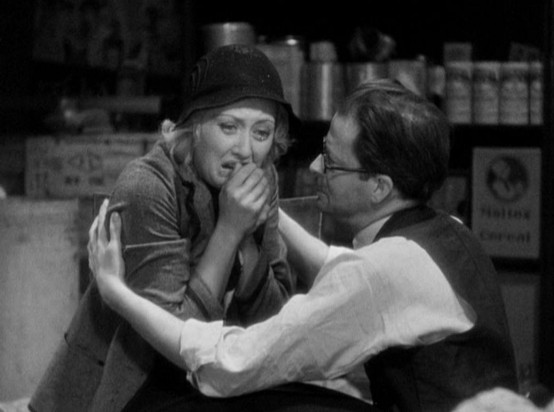
Freddie (Sam Godfrey) to Blondie: “They had no business to put her out in the street when it was cold and wet. You make them pay for it, you hear …”
Virginia “Blondie” Johnson soon arrives in the big city where she forges an immediate bond with a cab driver (Sterling Holloway) after each runs a friendly penny-ante hustle on the other. That evening they meet up to work a con together and wind up swindling $40 out of several unsuspecting men including Danny Jones (Morris), who catches up to Blondie by the end of that night and is soon trading barbs with her. “You’re a fresh dame,” he says, a line he settles on her with growing affection throughout Blondie Johnson.
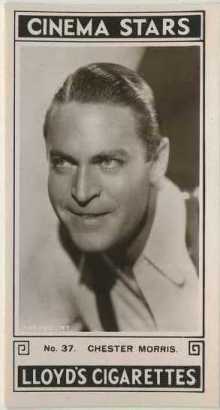 Danny points Blondie over to the man at the cash register (Charles Lane in a brief appearance), who informs her that Danny is the right hand man for Max Wagner (Arthur Vinton), a racketeer in charge of pretty much everything in town. Danny and Blondie are soon back at his place for drinks and to talk business, even if Danny needs some quick straightening out as to the purpose of their meeting. She impresses Danny with an improvement on his own scheme to clear Louie (Allen Jenkins), one of his associates, at a forthcoming trial. But kingpin Max is sour on the idea. Blondie and Danny talk it over at a Chop Suey joint after leaving Max.
Danny points Blondie over to the man at the cash register (Charles Lane in a brief appearance), who informs her that Danny is the right hand man for Max Wagner (Arthur Vinton), a racketeer in charge of pretty much everything in town. Danny and Blondie are soon back at his place for drinks and to talk business, even if Danny needs some quick straightening out as to the purpose of their meeting. She impresses Danny with an improvement on his own scheme to clear Louie (Allen Jenkins), one of his associates, at a forthcoming trial. But kingpin Max is sour on the idea. Blondie and Danny talk it over at a Chop Suey joint after leaving Max.
“So that’s the big boss, eh?”
“Yeah,” says Danny. “I don’t know what’s the matter with him.”
“He’s yellow, that’s what’s the matter with him,” Blondie says. “You can read it all over his face.”
Danny and Blondie pull off her courtroom deceit while Max is out of town and afterward celebrate at a banquet honoring Louie’s freedom that is the spitting image of the party Enrico Bandello threw for himself a couple of years earlier in Little Caesar.
At the party we meet the entire gang. Besides Jenkins as Louie there’s Earle Foxe as Scannell, the lawyer who cleared him with Blondie’s assistance; Olin Howland chewing a match and sneering throughout as Eddie; Donald Kirke, an actor I wasn’t familiar with, as Joe, who along with Howland’s Eddie are a couple of Max’s top workers. Joe’s girlfriend Lulu is a surprise, played by the Japanese-born actress Toshia Mori, an interracial coupling that would soon be banned by the Production Code as miscegenation. Mae Busch, the former silent star just beginning to carve out a name all over again in support of Laurel and Hardy, is on hand as Eddie’s tough-talking moll who becomes fast friends with Blondie.
Danny’s speech to this group is interrupted when Max fills the doorway with two more familiar faces: Claire Dodd as Gladys, a musical-comedy star who also has eyes for Danny, and Tom Kennedy, later a Torchy Blane regular, as Hype, Max’s muscle.
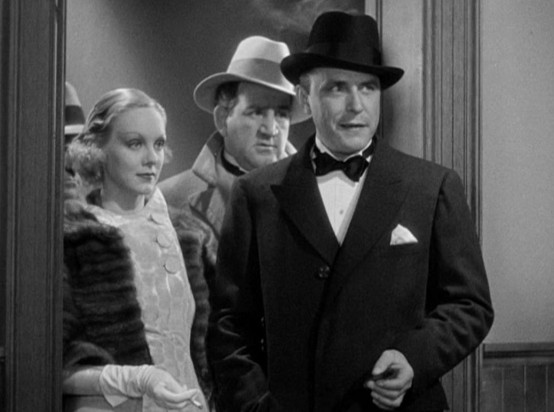
Claire Dodd is “the dame with the platinum chassis” with boss Arthur Vinton. Tom Kennedy behind Vinton.
Such a lengthy roll call of Warner Brothers’ contract players and other supporting cast members is not unusual, but Blondie Johnson uses these riches particularly well. When the cast is this deep these supporting players usually seem to visit for just one scene before moving on to the next set where they provide their usual trademarks all over again in another movie. In Blondie Johnson they are each provided a little more background and opportunity than usual and get to contribute more than their typical single infusion of color throughout the movie. Despite weighing in at just 67-minutes each of these actors work multiple scenes and have their dialogue spread out throughout the film. Even Sterling Holloway, who seemed all but forgotten once Blondie met Danny, returns towards the end of the movie, not only to say hi, but to let us know what he has been up to and even wonder if he has taken the proper path.
Yet despite all of this support, or maybe because of it, Blondie Johnson is wholly Joan Blondell’s movie. Only she and Chester Morris are billed on the title card and deservedly so. Blondell shines throughout, especially when called upon for raw emotion at the beginning and the end of the movie. The opening is especially impressive as Blondell moves from her desperate appeal to the man on the welfare board to maimed cub when faced with her mother’s death before defiantly rising to wrath in response to the lip service from lawyer and priest alike in the aftermath of that traumatic moment.
In between she’s the more familiar Blondell, good humored and filled with sharp barbs, just one of the boys, as is necessary when running with this pack. She’s not unlike her gold diggers of the era in scenes like her courtroom breakdown in support of Jenkins and her bold swindling of Joseph Cawthorn, who plays it straight (without a comic accent for the first time I’ve noticed) as a jewel merchant targeted by Danny and Blondie for an elaborate insurance scam. She fights off Danny’s advances throughout, though does so with enough regret to make it clear that she’ll eventually drop her defenses.
I don’t think I’ve ever seen Joan Blondell have quite as much fun as she does in the scene coming right after the gang has moved on from Max’s leadership. Danny is installed as their leader, but Blondie is calling all of the shots around the table. “There’s only one more thing,” Blondell says, waving her cigarette and exhaling smoke as she brings this meeting to a close. “Stick together and it’s in the bag.” She’s smirking as the scene fades out with a twinkle in her eye that’s all Joan Blondell and not Blondie Johnson. Every time I’ve watched this I get the feeling that Blondell was soon doubled over in laughter with her male co-stars around the table. Credit the loose atmosphere fostered by director Enright, I suppose.
In the same interview that Blondell glowed over Enright she also credited Chester Morris for giving “a grand performance.”
Morris, recently of Red Headed Woman (1932) with Jean Harlow, is perfect as Danny, the none-too-bright underling who wants Blondie more than he wants to be leader. “We’re in a fast game. It don’t last long. Why can’t we have a little fun before it’s all over,” he pleads with Blondie after she’s pushed him off of her. She wants to, but her recent history dictates that they accumulate as much money as possible before this fast game winds up. He’s easily maneuvered by any insinuation she makes of his being afraid and Blondie backs it up by stressing “business before pleasure.”
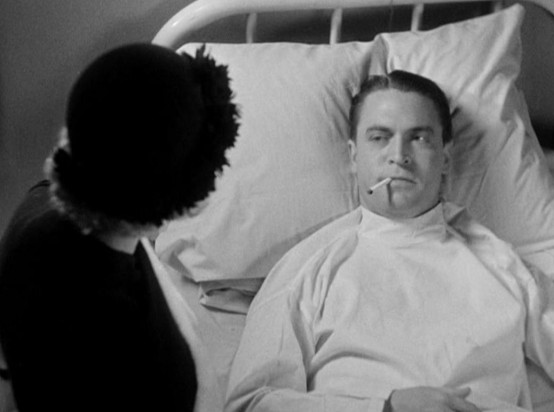
Chester Morris is so tough that he chews gum and smokes cigarettes … at the same time. The entire movie.
Danny can never completely accept this and as you might imagine this opens up opportunity for Claire Dodd’s fortune hunting actress. This leads to the most interesting part of Blondie Johnson, as Blondell rises to knock Danny from power, all with the blessing and backing of the gang.
I’d say Blondie Johnson moves towards becoming more of a typical love story from there, but I can’t think of another movie romance where the leading lady orders a hit on her leading man, so don’t think it’s too typical!
Blondie Johnson is exactly what you would hope for it to be, a typical Joan Blondell offering crossed with a pre-Code gangster flick. But Blondie’s not the moll; she’s the brains of the outfit. Don’t head in expecting to see Joan Blondell mow down extras with a machine-gun. While Blondie does pack a pistol, the only time we see it it’s being taken away from her. Just like any good crime boss she leaves the dirty business to underlings.
Blondie Johnson is available for purchase as a newly remastered Made to Order DVD-R from the Warner Archive.
For more on Blondie Johnson check out Danny’s review at Pre-Code.com. I’m with him, it’s a better movie if the last scene is cut out, but I don’t think period audiences would have appreciated the darker ending such a move would have left them with. Danny covers all of the pre-Code elements of Blondie Johnson in his piece.
Over at Twenty Four Frames John Greco talks about how modern Blondie is as well as Blondell’s excellent Blondell performance. And The Nitrate Diva has the blow-by-blow plus even more screen captures than I do before wrapping up with some very sharp analysis.
Cited:
- Creelman, Eileen. “Picture Plays and Players.” New York Sun 10 Jan 1933: 30. Web. Old Fulton NY Post Cards 27 Sep 2013.
- ”New Pictures You Should See—And Why.” The New Movie Magazine Feb 1933: 59. Web. Media History Digital Library. 27 Sep 2013.

This Jake Rosenthal has some nerve! Anyway, it’s his theater. BLONDIE JOHNSON ad from the Waterloo Daily Courier of Iowa, March 12, 1933, page 14.
An interesting note as to the timing of Blondie Johnson’s release. It was in theaters at the same time as Clear All Wires!, which I recently talked about, and Child of Manhattan, which I recently talked around. Struck me as worth mentioning after seeing all three discussed in a 1933 newspaper review.

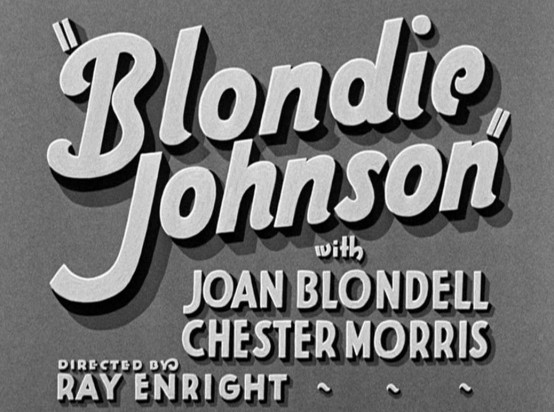



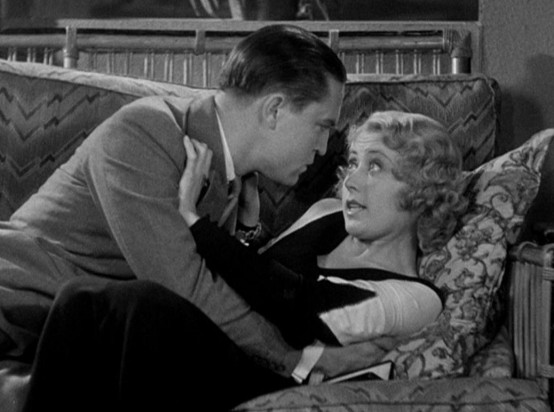



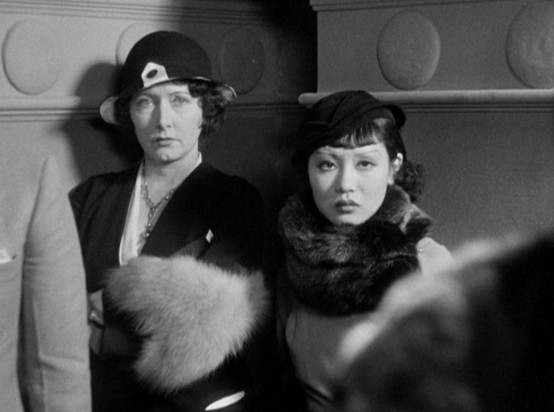
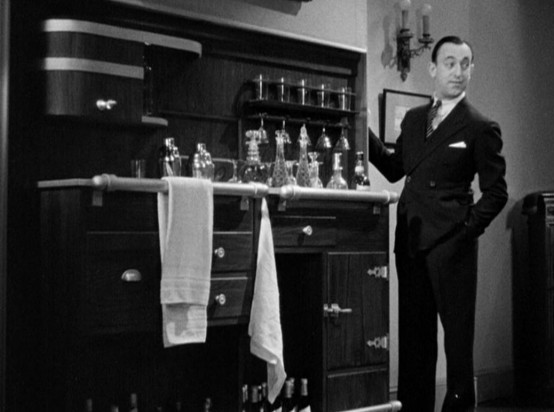
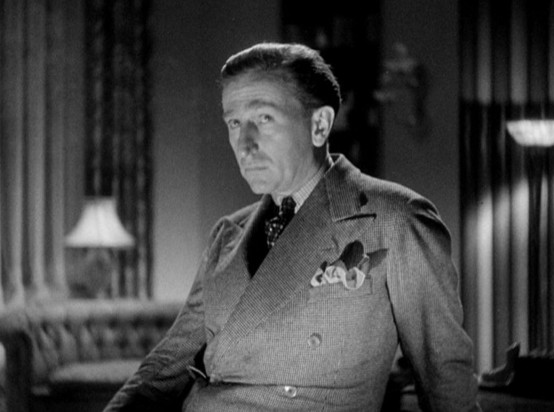

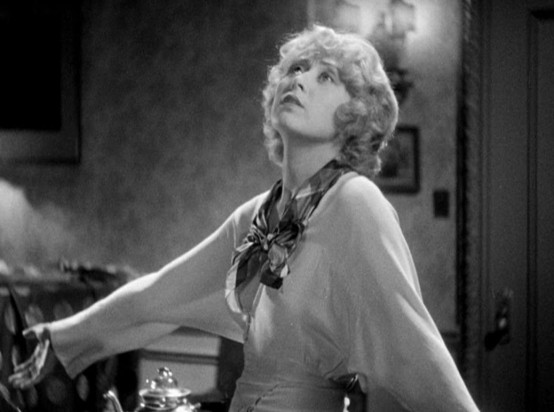

I’m not that familiar with Joan Blondell’s work – just some of her comedies – so I’m keen to see her in this role. She sounds utterly fabulous. Thanks for letting me know about this film.
This is one that feels like it should be better known and thankfully it has a chance to be thanks to Warner Archive. Blondell is her typical self here and that works with the whole gangster setting. “Lady Cagney” indeed! Definitely recommend picking up a copy!